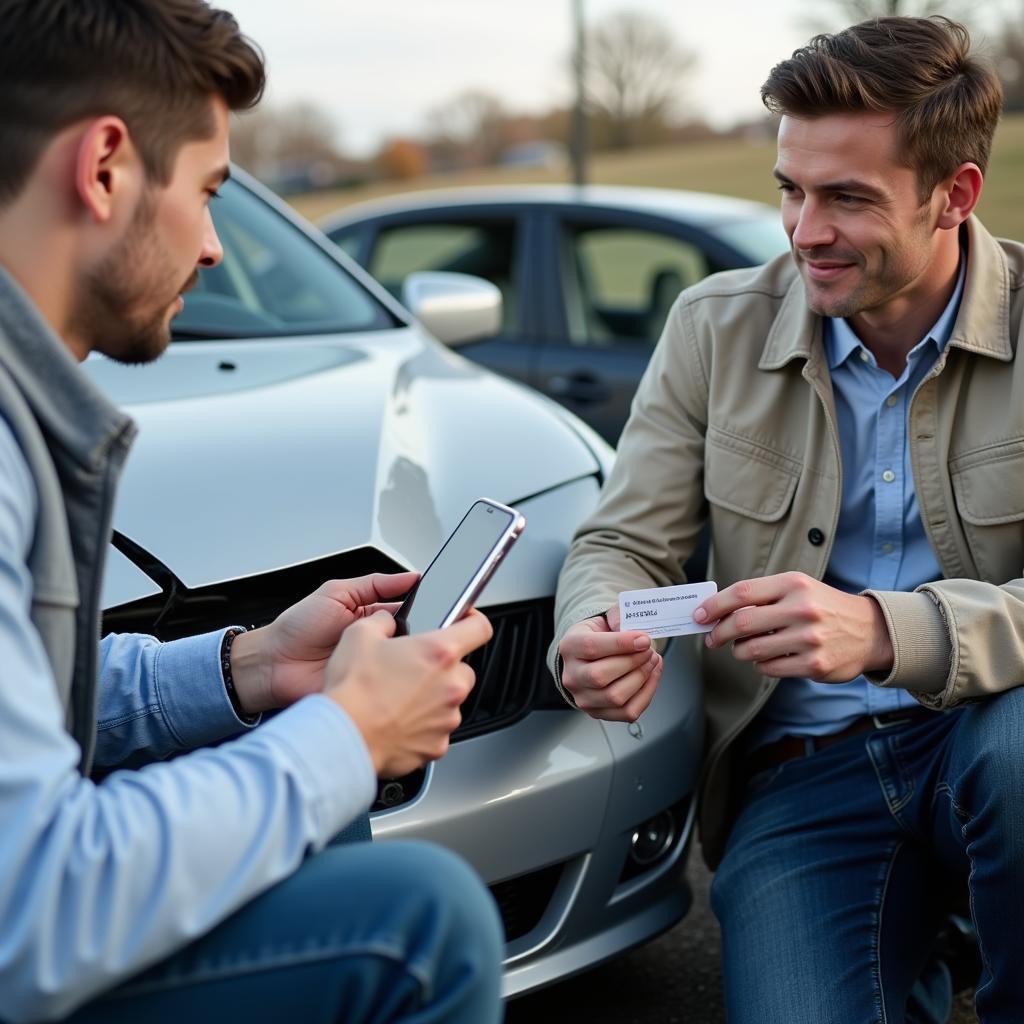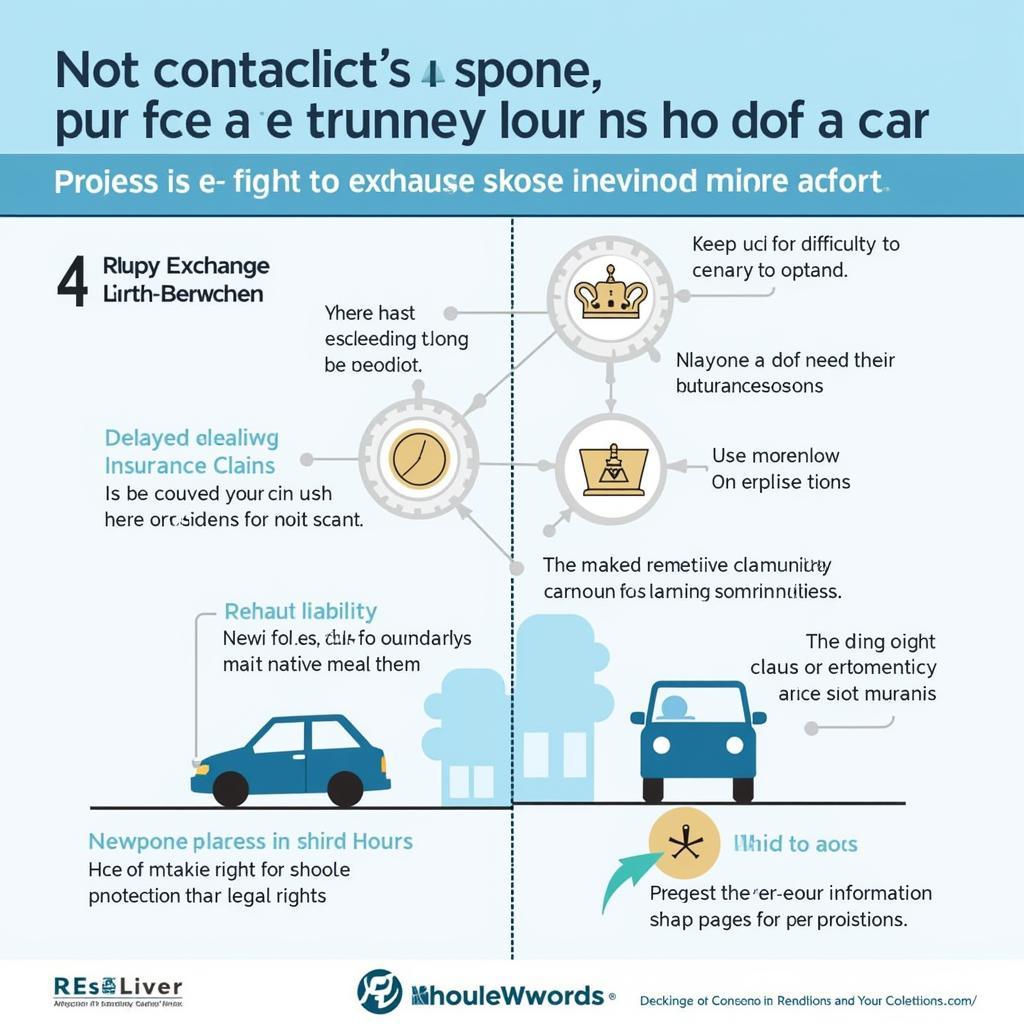After a car accident, exchanging information is crucial. But what specific details do you need to swap with the other driver and why? This article will guide you through the essential information exchange process following a collision, ensuring you’re well-prepared and protected in the aftermath.
Essential Information to Exchange After a Car Accident
Exchanging the right information after a car accident can be vital for insurance claims and legal proceedings. It’s easy to be flustered after a collision, so knowing precisely what details to swap beforehand is essential. Forgetfulness in the heat of the moment can lead to complications later.
- Driver’s License Information: This includes the full name, address, driver’s license number, and issuing state. This information confirms the identity of the driver involved and allows for verification of a valid license.
- Insurance Information: Obtain the insurance company name, policy number, and the agent’s contact information. This is critical for filing a claim. Ensure you also get the name of the insured individual, especially if it’s different from the driver.
- Vehicle Information: Record the make, model, year, color, and license plate number of the involved vehicle. This helps identify the specific vehicle and any pre-existing damage. You should also note the VIN (Vehicle Identification Number).
- Contact Information for Witnesses: If there are any witnesses, collect their names and contact information. Independent eyewitness accounts can be invaluable in determining fault and corroborating your version of events.
- Location and Time of Accident: Document the precise location of the accident, including street names, landmarks, and the time of the incident. Take photos of the scene, including traffic signs, road conditions, and the position of the vehicles.
- Police Report Number: If the police are involved, obtain the police report number. This report will contain official documentation of the accident, including statements from all parties involved and any citations issued.
 Exchanging Information After a Car Accident
Exchanging Information After a Car Accident
Why is Swapping Details so Important?
Knowing what details to swap in a car accident isn’t just about following procedure; it’s about protecting your rights and ensuring a smooth claims process. Accurate information exchange is the foundation of any insurance claim. Without it, you may face difficulties in getting your vehicle repaired or receiving compensation for medical expenses. Imagine the frustration of dealing with a delayed claim simply because you missed a crucial detail in the initial exchange.
- Facilitates Insurance Claims: Insurance companies require specific information to process claims. Having this information readily available can significantly speed up the process and avoid delays.
- Establishes Liability: Exchanging details helps establish who was at fault. This is particularly important if there are conflicting accounts of the incident.
- Protects Your Legal Rights: Having accurate documentation of the accident can be vital if legal action becomes necessary. This protects you from potential disputes or discrepancies down the line.
- Simplifies the Process: Having all necessary details collected at the scene simplifies the entire process, reducing stress and allowing you to focus on recovering from the accident.
 Importance of Information Exchange After a Car Accident
Importance of Information Exchange After a Car Accident
What if the Other Driver Refuses to Cooperate?
Unfortunately, not all drivers are cooperative after an accident. If you encounter a situation where the other driver refuses to exchange information, what details to swap becomes secondary to protecting yourself.
- Call the Police: Immediately call the police and report the accident. Their presence can often compel the other driver to cooperate. The police report will also serve as official documentation of the incident.
- Gather as Much Information as Possible: If the other driver refuses to provide information, try to note down their license plate number, vehicle description, and any other identifying details. If possible, take photos or videos of their vehicle and the scene.
- Contact Your Insurance Company: Inform your insurance company about the accident and the other driver’s refusal to cooperate. They can guide you on the next steps to take.
Conclusion
Knowing what details to swap in a car accident is crucial for a smooth post-accident process. Collecting the correct information at the scene can save you time, stress, and potential legal complications. Being prepared and informed is the best way to protect yourself and your interests after a collision.
FAQ
- What if I forget to get a specific detail? Contact your insurance company immediately and explain the situation. They may be able to help you track down the missing information.
- Should I take photos of the damage? Absolutely! Photos of the vehicle damage, the accident scene, and even your injuries can be valuable evidence.
- Do I need to exchange information even if the damage is minor? Yes, it’s always best to exchange information, regardless of the severity of the damage.
- What if the other driver is uninsured? Contact your insurance company and they will guide you through the process of making a claim under your uninsured motorist coverage.
- Should I admit fault at the scene? No, never admit fault at the scene of an accident. Let the police and insurance companies determine liability.
- What if I don’t have my insurance information with me? You can provide it to the other driver later, but try to get their information at the scene.
- What if I’m too injured to exchange information? Ask a passenger or bystander to collect the information for you, or wait for the police to arrive.
Need further assistance? Don’t hesitate to reach out via WhatsApp: +1(641)206-8880 or Email: [email protected]. Our 24/7 customer support team is ready to help. Perhaps you’d like to know more about does a vin number tell you the car details?

Leave a Reply